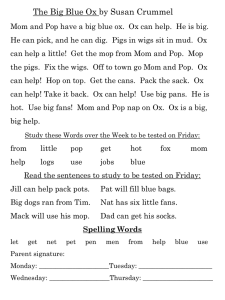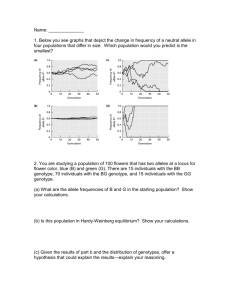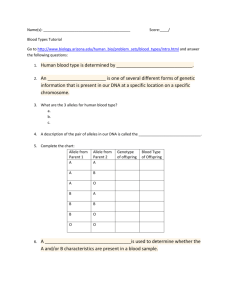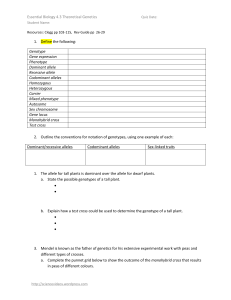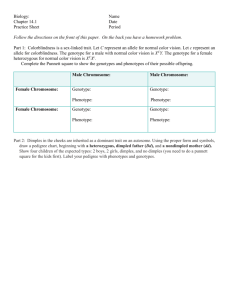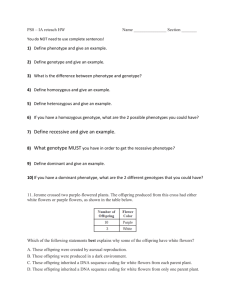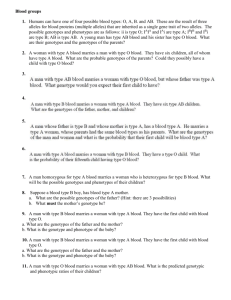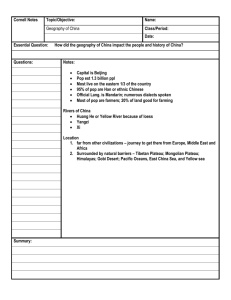Answer Sheet
advertisement
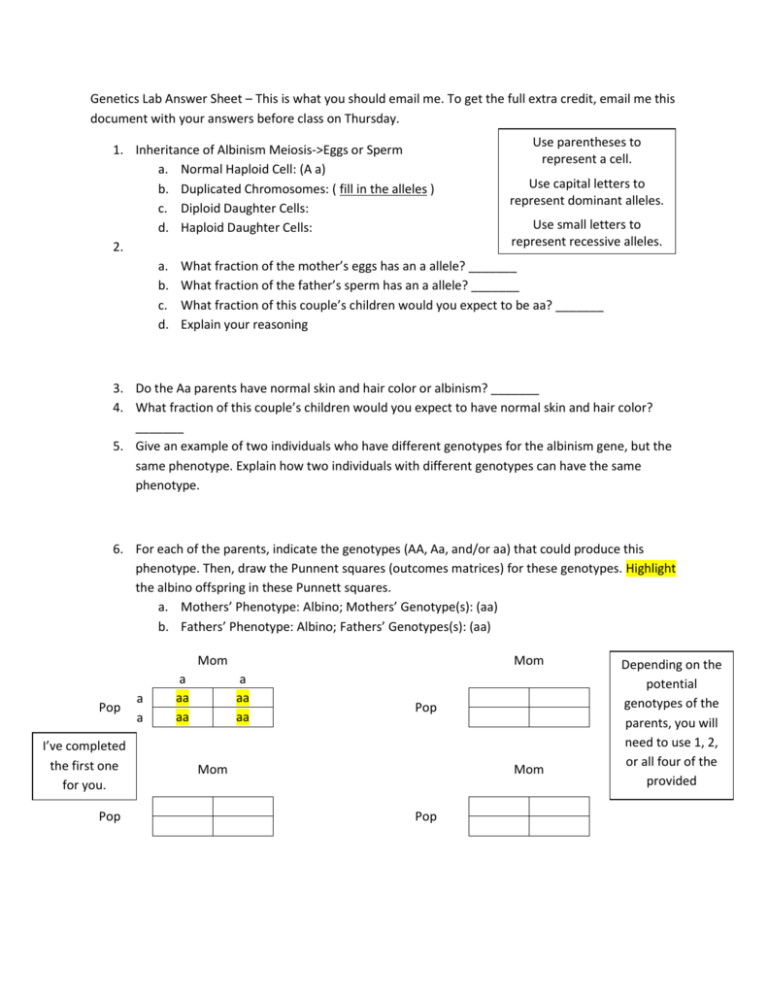
Genetics Lab Answer Sheet – This is what you should email me. To get the full extra credit, email me this document with your answers before class on Thursday. Use parentheses to 1. Inheritance of Albinism Meiosis->Eggs or Sperm represent a cell. a. Normal Haploid Cell: (A a) Use capital letters to b. Duplicated Chromosomes: ( fill in the alleles ) represent dominant alleles. c. Diploid Daughter Cells: Use small letters to d. Haploid Daughter Cells: represent recessive alleles. 2. a. What fraction of the mother’s eggs has an a allele? _______ b. What fraction of the father’s sperm has an a allele? _______ c. What fraction of this couple’s children would you expect to be aa? _______ d. Explain your reasoning 3. Do the Aa parents have normal skin and hair color or albinism? _______ 4. What fraction of this couple’s children would you expect to have normal skin and hair color? _______ 5. Give an example of two individuals who have different genotypes for the albinism gene, but the same phenotype. Explain how two individuals with different genotypes can have the same phenotype. 6. For each of the parents, indicate the genotypes (AA, Aa, and/or aa) that could produce this phenotype. Then, draw the Punnent squares (outcomes matrices) for these genotypes. Highlight the albino offspring in these Punnett squares. a. Mothers’ Phenotype: Albino; Mothers’ Genotype(s): (aa) b. Fathers’ Phenotype: Albino; Fathers’ Genotypes(s): (aa) Mom Pop I’ve completed the first one for you. Pop a a a aa aa Mom a aa aa Pop Mom Mom Pop Depending on the potential genotypes of the parents, you will need to use 1, 2, or all four of the provided matrices. c. Mothers’ Phenotype: Albino; Mothers’ Genotype(s): d. Fathers’ Phenotype: Normal; Fathers’ Genotypes(s): Mom Pop Mom Pop Mom Pop Mom Pop e. Mothers’ Phenotype: Normal; Mothers’ Genotype(s): f. Fathers’ Phenotype: Normal; Fathers’ Genotypes(s): Mom Pop Mom Pop Mom Pop Mom Pop g. Which couple would be the most likely to have albino children? Indicate their genotypes below. i. Mom’s genotype: ii. Pop’s genotype: h. Which couple would be the least likely to have albino children? i. Mom’s genotype: ii. Pops’s genotype 7. Explain why two albino parents will not have any children with normal skin and hair color, but two parents with normal skin and hair color could have an albino child. 8. Coin toss genetics: Don’t find someone to “mate” with. Just flip your coin twice. Let the first flip be the “egg” and the second be the “sperm.” Each family has four children and you’re tosses will determine the composition of the family. Please record the number of children that have the following genotypes for each family and the totals. William will reveal the outcomes of the classes coin tosses at the next lab meeting. First family of 4 Second family of 4 Third family of 4 Fourth family of 4 Totals Predictions # AA Children # Aa Children # aa Children 4 8 4 9. Normal red blood cells can barely squeeze through the capillaries. What problems might be caused by sickle-shaped blood cells? 10. Most children with sickle cell anemia have parents who do not have sickle cell anemia. Explain how a person can inherit sickle cell alleles from parents who do not have sickle cell anemia. Is the sickle cell allele dominant (S) or recessive (s)? Explain your reasoning. Include a Punnett Square in your answer. Mom Pop 11. Rasheda and Craig do not have sickle cell anemia, but their first child has sickle cell anemia. What is the probability that their second child will have sickle cell anemia? Explain your reasoning? 12. Explain how the hemoglobin gene illustrates the following generalization: A single gene often has multiple phenotypic effects. 13. How do the examples involving sickle cell and normal alleles for the hemoglobin gene explain the general principle that neither allele is completely dominant or completely recessive? Note that this incomplete dominance is consistent with Blending inheritance models. This answer sheet is derived heavily from the Genetics handout created by Drs. Poethig, Waldron, and Doherty in 2013. For the original or more materials created by these individuals, please check http://serendip.brynmawr.edu/sci_edu/waldron/#genetics .
